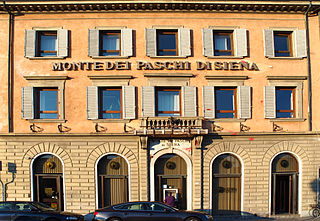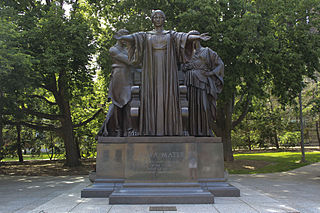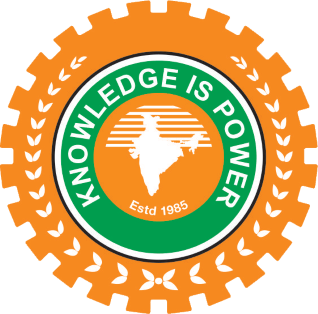
A college is an educational institution or a constituent part of one. A college may be a degree-awarding tertiary educational institution, a part of a collegiate or federal university, an institution offering vocational education, a further education institution, or a secondary school.

The European Parliament (EP) is one of the two legislative bodies of the European Union and one of its seven institutions. Together with the Council of the European Union, it adopts European legislation, following a proposal by the European Commission. The Parliament is composed of 720 members (MEPs), after the June 2024 European elections, from a previous 705 MEPs. It represents the second-largest democratic electorate in the world, with an electorate of around 375 million eligible voters in 2024.

The World Bank Group (WBG) is a family of five international organizations that make leveraged loans to developing countries. It is the largest and best-known development bank in the world and an observer at the United Nations Development Group. The bank is headquartered in Washington, D.C., in the United States. It provided around $98.83 billion in loans and assistance to "developing" and transition countries in the 2021 fiscal year. The bank's stated mission is to achieve the twin goals of ending extreme poverty and building shared prosperity. Total lending as of 2015 for the last 10 years through Development Policy Financing was approximately $117 billion. Its five organizations are:

The Smithsonian Institution, or simply the Smithsonian, is a group of museums, education and research centers, the largest such complex in the world, created by the U.S. government "for the increase and diffusion of knowledge." Founded on August 10, 1846, it operates as a trust instrumentality and is not formally a part of any of the three branches of the federal government. The institution is named after its founding donor, British scientist James Smithson. It was originally organized as the United States National Museum, but that name ceased to exist administratively in 1967.

An organization or organisation, is an entity—such as a company, or corporation or an institution, or an association—comprising one or more people and having a particular purpose.

A financial institution, sometimes called a banking institution, is a business entity that provides service as an intermediary for different types of financial monetary transactions. Broadly speaking, there are three major types of financial institution:
- Depository institution – deposit-taking institution that accepts and manages deposits and makes loans, including bank, building society, credit union, trust company, and mortgage broker;
- Contractual institution – insurance company and pension fund
- Investment institution – investment bank, underwriter, and other different types of financial entities managing investments.
Systemic bias is the inherent tendency of a process to support particular outcomes. The term generally refers to human systems such as institutions. Systemic bias is related to and overlaps conceptually with institutional bias and structural bias, and the terms are often used interchangeably.

An institution is a humanly devised structure of rules and norms that shape and constrain social behavior. All definitions of institutions generally entail that there is a level of persistence and continuity. Laws, rules, social conventions and norms are all examples of institutions. Institutions vary in their level of formality and informality.

Anna University is a public state university located in Chennai, Tamil Nadu, India. The main campus is in Guindy. It was originally established on 4 September 1978 and is named after C.N.Annadurai, the former Chief Minister of Tamil Nadu.

The Russell Group is a self-selected association of twenty-four public research universities in the United Kingdom. The group is headquartered in Cambridge and was established in 1994 to represent its members' interests, principally to government and Parliament. It was incorporated in 2007. Its members are often perceived as being the UK's best universities, but this has been disputed.

Tumakuru district is an administrative district in the state of Karnataka in India. It is the third largest district in Karnataka by land area with an area of 10,598 km2, and fourth largest by Population. It is a one-and-a-half-hour drive from Bengaluru, the state capital. The district is known for the production of coconuts and is also called as 'Kalpataru Nadu'. It is the only discontiguous district in Karnataka.
Gram Panchayat is a basic governing institution in Indian villages. It is a political institution, acting as the cabinet of a village or group of villages. The Gram Sabha works as the general body of the Gram Panchayat. The members of the gram panchayat are elected directly by the people. The gram panchayat is headed by an elected President and Vice President, assisted by a Secretary who serves as the administrative head of the panchayat. The president of a gram panchayat is known as a "Pradhan" or "Sarpanch" in Northern India. There are about 250,000 gram panchayats present in India.

SRM Institute of Science and Technology (SRMIST), formerly SRM University, is a private deemed university, located in Kattankulathur, Chengalpattu, Tamil Nadu, India. Founded in 1985 as SRM Engineering College in Kattankulathur, it gained the deemed University status in 2002. SRM Institute of Science and Technology is spread across five campuses — Kattankulathur, Ramapuram, Vadapalani,(all in Chennai), Ghaziabad and Tiruchirappalli. Those are all same University as per section 3 of University Grants Commission Act, 1956. It has three sister universities in Andhra Pradesh, Haryana and Sikkim.
The athletic nickname, or equivalently athletic moniker, of a university or college within the United States and Canada is the name officially adopted by that institution for at least the members of its athletic teams. Typically as a matter of engendering school spirit, the institution either officially or unofficially uses this moniker of the institution's athletic teams also as a nickname to refer to people associated with the institution, especially its current students, but also often its alumni, its faculty, and its administration as well. This practice at the university and college tertiary higher-education level has proven so popular that it extended to the high school secondary-education level in the United States and Canada and even to the primary-education level as well.

In sociology, a social organization is a pattern of relationships between and among individuals and groups.

The Institution of Structural Engineers is a British professional body for structural engineers.

Alumni are former students or graduates of a school, college, or university. The feminine plural alumnae is sometimes used for groups of women, and alums or alumns as gender-neutral alternatives. The word comes from Latin, meaning nurslings, pupils or foster children, derived from alere "to nourish".

Hindustan Institute of Technology and Science (HITS), formerly Hindustan College of Engineering, is a private deemed university headquartered in Chennai, India. It was founded in 1985 by K.C.G. Verghese and was conferred the "University Status" status from the University Grants Commission Under Section 3 of UGC Act 1956 from the academic year 2008-09 and under the name HITS. It is a member of the Hindustan Group of Institutions which also includes the Hindustan Institute of Engineering Technology, KCG College of Technology, Hindustan College of Arts and Science, Hindustan International Schools, and more.

National Institutional Ranking Framework (NIRF) is a ranking methodology released annually by the Ministry of Education, Government of India, to rank institutions of higher education in India. The framework was approved by the former Ministry of Human Resource Development and launched by the Minister on 29 September 2015.

World Flora Online is an Internet-based compendium of the world's plant species.
















